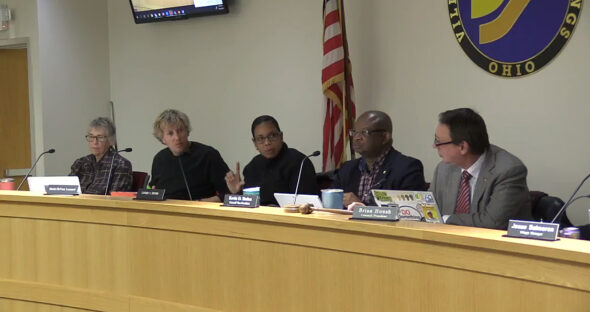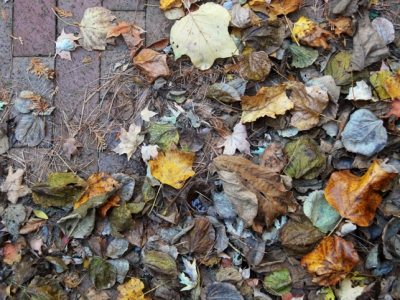
Present at the Monday, Nov. 21, regular Village Council meeting were Council members Marianne Macqueen, Gavin DeVore Leonard, Carmen Brown, Vice President Kevin Stokes, President Brian Housh, Village Manager Josué Salmerón and Village Clerk Judy Kintner. (Video still)
Village Council discusses vendor fees
- Published: December 10, 2022
At its most recent meeting on Monday, Nov. 21, Village Council members heard a first reading of an ordinance aimed at tracking and regulating door-to-door sales people and itinerant vendors who sell their wares in the village. If the legislation passes as read, vendors will be required to register monthly with the Village and pay a $25 fee each month.
Village Manager Josué Salmerón said the legislation was partially aimed at ensuring the Village was collecting taxes on income made within the village.
“We are closing the gap in the taxation process,” Salmerón said.
Currently, vendors do not have to register with the Village, which Salmerón said makes it difficult for the Village to request audits from the Regional Income Tax Agency, or RITA, which collects income taxes on behalf of the Village.
“It gets us a list of registered vendors that we can pass off to RITA,” Salmerón said.
Council President Brian Housh said the legislation followed several conversations with representatives from RITA. At those meetings, Housh said, Village representatives were told that having a list of registered vendors allowed RITA to send each vendor notices about their tax obligations and help vendors with the filing process.
Housh said the ordinance would also close another loophole in the code — one that said vendors making handmade goods did not need to pay taxes. Housh said there was a challenge with determining whether all items for sale at a specific vendor were handmade. Housh said he also fielded complaints from downtown business owners who said street vendors create “unfair competition.”
“At the end of the day for me this is about [taxes]. If you’re supposed to pay the tax, then you should,” Housh said.
Council member Marianne MacQueen asked for clarification about the duration of the vendor’s license, which is written as 30 days.
“If someone is at Nipper’s Corner, they would have to come in every 30 days and pay $25?” MacQueen said.
Salmerón said the requirement to renew vending permits every 30 days was aimed at door to door sales people, but would affect everyone, including vendors who purchase booth space at Street Fair and other festivals in the village.
“It seems unnecessary to me,” MacQueen said.
Council member Gavin DeVore Leonard said he agreed with MacQueen, and asked about the background to the ordinance.
“What led to looking into this?” DeVore Leonard asked.
Salmerón said the impetus of the legislation was finding ways to ensure all vendors were being taxed fairly. In response to a question from the News, Salmerón said he did not know how many itinerant vendors currently sell in Yellow Springs.
Housh said that he believed it would be a good idea to adjust the requirement for vendors to register every 30 days and provide an exception for Street Fair vendors. Council member Carmen Brown said she would like to know exactly how many vendors would be affected by the new legislation, have some more clarity on RITA’s enforcement process, and how the Village’s licensure would be different from licenses vendors are required to procure through the state.
“How is this going to be enforceable other than us collecting $25,” Brown said, adding that exempting Street Fair vendors would significantly diminish the revenue brought in by the license.
“I’m having a hard time understanding why this is going to be necessary for us.”
In other Village Council business, Nov. 21:
American municipal power rate study
Council members heard a presentation from representatives of Courtney and Associates, who gave an overview of the Village’s current fee schedules and revenue requirements for water, sewer and electric utilities through 2026. According to Courtney, the Village will likely need to raise rates to keep up with rising costs.
Courtney said their analysis was based on factors including the Village’s current rates for services, historical data, anticipated changes in operations and estimated inflation of 3% per year.
Looking forward, Courtney said the Village should consider phased-in rate adjustments for each utility. By 2026, Courtney said, sewer revenues would need to increase by 24%, water rates by 41% and electric rates by 6%.
Sidewalks
Council members discussed the growing number of complaints about sidewalk maintenance throughout the village. The uptick in complaints was highlighted in a letter to Council from Zoning Administrator Denise Swinger, who said staff was having trouble investigating the myriad of complaints. Salmerón said that he had already changed some internal processes regarding complaints.
“What we are changing is the prioritization of the complaints,” Salmerón said.
A change in prioritization means two things: if obstructions—such as overhanging flowers or branches—cover less than 20% of the sidewalk, they will not be prioritized; property owners with larger obstructions will be given one warning before receiving a citation.
“We are no longer going to issue multiple letters,” Salmerón said.
Villager Mitzie Miller, who has spoken at length in Council meetings, on social media and in letters to the editor about sidewalk safety, urged Council members to not “move backwards” on the progress the Village has made in clearing sidewalks and enforcing the Village’s sidewalk ordinances.
Council members decided to continue to hone the sidewalk ordinances and enforcement policies. Council member Marianne MacQueen said the Village should prioritize education over punitive measures.
“We need to look at this as a cultural shift,” MacQueen said. “Those take time.”
Citizen concerns
In the portion of the meeting aimed at hearing the concerns of villagers, Council members heard an appeal from Reilly Dixon, a member of the Environmental Commission, who asked that Council consider writing a no-idling ordinance for the Village. Citing recent data from the Environmental Protection Agency, Dixon said that of the 27% of total greenhouse gas emissions that come from transportation, 57% of those emissions are from light duty vehicles — typically passenger vehicles. Dixon proposed that the Village prohibit vehicles from idling more than 2–3 minutes, with exceptions for emergency vehicles. Dixon said the Environmental Commission would be submitting an in-depth proposal to Council in the coming months.
The Yellow Springs News encourages respectful discussion of this article.
You must login to post a comment.
Don't have a login? Register for a free YSNews.com account.













No comments yet for this article.